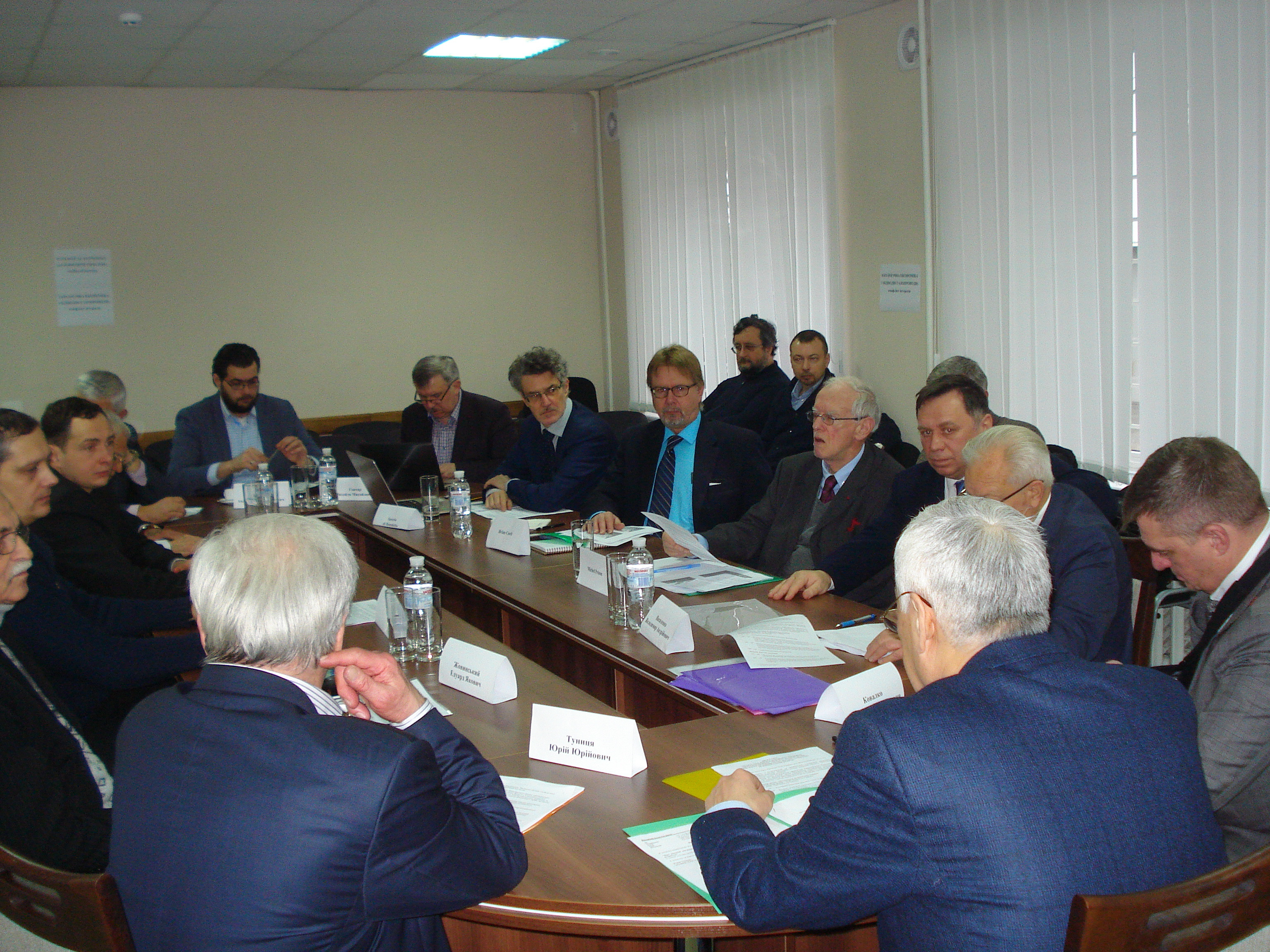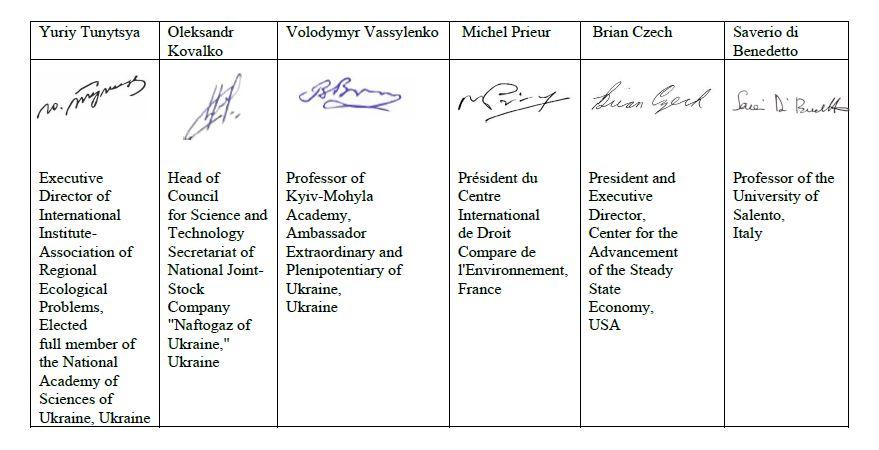KYIV COMMUNIQUÉ
On the Environmental Impact and Economic Sustainability of Nord Stream 2 and Other Sub-Marine Natural Gas Pipelines
Kyiv, November 6, 2019
Summary
Representatives of the Ukraine National Academy of Sciences, National Technical University of Ukraine, Ukrainian National Forestry University, Naftogaz Board for Science and Technologies, Institute of Market Problems and Ecological Economics Research, Ukrainian Institute for the Future, and scholars from France, Italy, and the USA convened at the Presidium of the Ukraine National Academy of Sciences in Kyiv on 1 February 2019 to consider the environmental and economic issues associated with the Nord Stream 2 (NS 2) pipeline project. The resulting communiqué, refined in subsequent months and released on 6 November 2019, underlines the urgency of interdisciplinary research on the impact of NS 2 and other international sub-marine natural gas pipeline projects. We call for a detailed assessment of the environmental impacts, microeconomic efficiency, and macroeconomic sustainability of NS 2, as well as its consistency with international laws and agreements.

Drafting of the Kyiv Communiqué
Background
Construction, operation, and decommissioning of natural gas pipelines, as well as the indirect effects at each stage, must be viewed within the context of sustainability for present and future generations. Pipelines such as NS 2 are proposed and defended on the basis that they are useful for economic growth. However, it has become increasingly apparent in the 21st century that economic growth (increasing production and consumption of goods and services in the aggregate, indicated by growing GDP) is not perpetually sustainable and is causing serious environmental and economic problems in Europe, Asia, and the world. Therefore, it is entirely feasible that NS 2 would cause more problems than it would solve.
European authorities have already condemned the project. For example, the European Parliament’s Resolution of December 12, 2018 (Clause 79) “condemns the construction of the Nord Stream 2 pipeline” and “calls for the project to be cancelled.” NS 2 is also under intense scrutiny pursuant to the fourth revision of the EU Commission’s Gas Directive (published February 4, 2019). The Gas Directive prescribes rules governing the EU’s internal gas market, and the revision extends the Directive’s applicability to pipelines from third countries.
NS 2 is also subject to the 2030 Agenda for Sustainable Development Goals (UN 2015), the Paris Agreement (2015), the Convention on the Law of the Sea (1982), the Espoo Convention (1991), and the Convention on Biological Diversity (1992). These and other international obligations of NS 2 host countries include extensive environmental impact assessment, avoidance of environmental damage, and mitigation or compensation for damages already caused, all in the context of international collaboration and jurisdiction.
Despite the strong objections to NS 2 and the environmental obligations in force for its host countries, some NS 2 project activities have already commenced. This has created a situation of urgency with regard to NS 2 investigation, oversight, monitoring, and the enforcement of European and other international agreements.
We call attention especially to the need for advanced, interdisciplinary research of NS 2, with application to other large-scale natural gas projects. An international scientific team is needed to incorporate expertise in fields such as geology, climatology, limnology, biochemistry, wildlife ecology, conservation biology, and related natural sciences. Principles of ecological economics—micro and macro—must be applied, and relevant principles and rules of international law and diplomacy must be explored in the attempt to ascertain the relative merits and legality of NS 2.
Establishment of International NS 2 Research Consortium
With beginning membership identified below, we hereby establish an international scientific consortium of experts under the umbrella of the National Academy of Sciences of Ukraine and within the framework of the International Institute-Association of Regional Ecological Problems (IIAREP). The IIAREP “NS 2 Research Consortium” will:
- Elaborate a program of interdisciplinary research on the impact of NS 2 and other sub-marine gas pipelines on the environment, energy security, economic sustainability, and social welfare of Europe, the broader region, and the global community.
- Describe the risks of NS 2 to human health and ecosystems as such and as a result of the prevalence of chemical and conventional munitions on or in the Baltic Seabed.
- Provide an analysis of international and European law relevant to NS 2 and other sub-marine gas pipelines;
- Assess the consistency of NS 2 with the relevant international and environmental laws.
- Assess the feasibility of multilateral instruments that provide for Ukraine’s participation in ongoing and future Baltic sub-marine pipeline negotiations.
- Assist if necessary with the development of:
- a moratorium on the implementation of NS 2;
- mechanisms for compensatory payments to parties aggrieved by premature, ongoing, or future NS 2 project activities, and;
- educational programs in ecological economics to highlight the unsustainability of perpetual economic growth and large-scale, sub-marine gas pipelines.
- Call upon the relevant European states, institutions, industries, and non-governmental organizations for political and financial support for Consortium activities while stressing the necessity of transparent and independent assessment consistent with the transdisciplinary principles of ecological economics.
Signatures and Parties

Print the official Kyiv Communiqué



As one of the co-authors of the Kyiv Communiqué, I am taking the unusual step of leaving the first comment. I want it first in the queue to defuse or soften a knee-jerk reaction that seems to be coming from certain activists and armchair followers of geopolitics. With incredible irony, CASSE has been portrayed by some of these folks as somehow complicit with the U.S. Government, and possibly even with certain energy companies!
Of course the USA — with Trump currently at the helm — is opposed to Nord Stream 2. And just as obviously (for those who know anything about CASSE), Trump’s opposition to NS 2 has absolutely nothing to do with ours.
For CASSE, this is not about the USA or Russia, and not even so much about Ukraine or Europe at large. The real issue here — given the mission of CASSE — is another massive environmental boondoggle that, when finished, will allow the “full-world economy” to bloat even further. And that affects everyone on Earth.
That said, for many people the geopolitics are more important. Comments of a geopolitical nature are welcomed here. Just keep it civil please (unlike some of the emails we’ve received).
After several decades of gas transit monopoly which is Ukraine about
to loose soon, comes this “sustainability communique”. This is a
comedy. A clear proof that environmental issues are used as a weapon
against Russia.
Would there be Kyiv communique if Ukraine retained it’s transit monopoly?
The only reason why Ukraine will loose it’s transit monopoly is that it foolishly let anti -Russian Western paid politicians to usurp power. Ukraine proved to be unreliable transit country and Nord Stream project was forced as alternative to all interested parties.
And last, but not the least, Western Europeans know well why they choose to import Russian gas. They do not have sentimental reasons for importing Russian gas. And they do not need Ukraine scientists to explain sustainability issues to them. Westerners have enough domestic scientists. If Western Europeans have some better and cheaper alternative they do not need to import Russian gas.
Simple matter of fact is that industrial civilization is based on thermal engines. And for thermal engines you need fossils.
If at all possible, Brian, disregard those comments. The essence of this communique is that we have to abandon fossil fuels, urgently, and that every energy project has to comply with the need to bring humanity, now and in the future, within the planetary natural boundaries.
Here is one set of data on CH4 everybody needs to know, irrespective of geopolitics, and use in every decision and action:
https://www.esrl.noaa.gov/gmd/ccgg/trends_ch4/
This trend cannot continue if we want Earth to continue to sustain life, in all its diversity, and human civilization, with all the deep changes needed to make it true civilization for all. Do we want to keep Earth as a livable planet, the only one we know of or we’ll ever know of as livable? Do enough of us want that?
I am writing this comment with much regret and a fair bit of irritation. Regret, because I had so far held CASSE in high esteem, and irritation because with its signature on this communiqué CASSE allows the cause of fighting for a no-growth-economy to be prostituted as a pawn in a political war.
Note, the pamphlet is not about fossil fuels in general; it is not even about the use of natural gas as such. It is about one particular pipeline that bypasses Ukraine’s own pipeline. And where exactly does the communiqué originate? Honi soit qui mal y pense.
Will we prevent the “full-world economy” from bloating even further if this pipeline is stopped? Of course not, Europe will either continue to rely on dirty coal and oil until renewable sources are built out, it will ship American shale gas over (as promoted by the US), or even increase reliance on nuclear power. None of these options are terribly environmentally attractive. Most importantly, replacing the “growth economy” is a fundamental issue and has much more to do with coming up with a sustainable mechanism for the distribution of wealth than with stopping one particular gas pipeline.
Of course, there are legitimate arguments to be had about too much reliance on one single energy supplier, and I don’t want to belittle such concerns. But that is a political discussion for the Europeans to have; why CASSE should weight into that is beyond me.
So, this Kyiv communiqué is not about stopping the growth economy, and it is not about the protection of the environment. It is a part of the current campaign against NS2. It is about power politics and money, with very nasty overtones as can be seen from the references below.
In my personal view, Brian was extremely naïve getting CASSE involved is this. The signature may give some cheap publicity, but it certainly weakens the organisation’s credibility.
https://www.reuters.com/article/us-germany-usa-russia-pipeline/u-s-warns-german-companies-of-possible-sanctions-over-russian-pipeline-idUSKCN1P70FR
https://www.washingtonpost.com/world/2019/01/14/us-ambassador-berlin-warns-germans-over-russian-gas-pipeline-triggering-applause-elsewhere/
https://www.wsj.com/articles/in-win-for-trump-merkel-changes-course-on-u-s-gas-imports-1540209647
https://www.nytimes.com/2019/10/07/business/energy-environment/germany-liquefied-natural-gas.html
https://www.rferl.org/a/us-efforts-stop-russia-pipelines-will-nord-stream-2-be-different/30107938.html
Hi Dieter,
I was recently sorting through old files and found a note about attempting to reach you in the past; so, I’ll start here with a few brief comments:
First, every decision about economic growth has geopolitical implications. We do our best to avoid this but it’s unavoidable; and things will only become more difficult as resource constraints exacerbate political tension.
Second, the economy grows one piece of infrastructure at a time. To neglect these opportunities to educate and act, and instead focus only on wealth distribution does not resonate with me as a sound strategy.
Finally, a steady state economy is a necessary condition for global peace, sustainability, and prosperity in the 21st century. If it is a pawn, it is an advanced pawn in the end game.
We will learn and refine our message as time evolves. Thanks for your note.
To sit on the sidelines and complain about everything, unless it is perfect, is easy. To get involved so you can influence things from the inside is hard. And when you do this you WILL become a target. Congrats to Brian for taking a step into a real-world fight where everybody does use everybody else. It ain’t pretty. But if we are going to get the message out there, that’s where our representatives need to be, and I applaud Brian for being there. (he’s right in the middle of the picture above) Of course, I agree there are those who will use us as geopolitical ammunition against their rivals in the struggle to get their hands on the levers of the energy flow. But just by having oil and gas people get involved in a discussion where the underlying theme is a steady-state future moves the needle of public understanding in the right direction. Keep up the good work, Brian.
….. tried to keep it short – didn’t quite work …..
If a new gas pipeline that increases overall capacity, but also rebalances existing capacity, is seen as an environmental boondoggle that further bloats the economy, why is this not the case with the Gas Terminals that Germany is now going to build for importing US shale gas? What makes this infrastructure “good” and the US gas not contributing to the bloated economy?
But who knows, perhaps Brian and his mates have already scheduled a meeting in Kyiv.
Skyler needs to answer whether all new infrastructure is evil. If a gas pipeline is built to decommission even dirtier coal, then the panel on this website seems to think that the pipeline is eval infrastructure.
If now gas fired stations are decommissioned to make room for newly constructed Windmills or Solar Systems; is this new wind and solar infrastructure also evil? Skyler, you need to define what you see as acceptable – not only in terms of the technology as such – but even more importantly what it is used for, before you can start being judgemental.
Coming back to CASSE, I could only find one article from 2010 being critical of fossil fuel. I have not seen any critical comments by Brian or CASSE on those boondoggles that plan to add a little less than 10 Million barrel per day to the US crude oil pipe network by 2021. No problems?
Or, the list of future interstate highways. It looks like CASSE is fine with them. At least Brian and his mates don’t seem to object.
And finally, we have to address prioritisation. If the restaurant around the corner adds another table, purists may be tempted to see this as yet another piece of infrastructure and bemoan the bloating of the “full world” economy. But in the scheme of things, I’m sure we all agree, the table is utterly irrelevant.
I hope we also agree that the deforestation of the Amazon is an immense disaster in many respects. The forbs magazine is usually not suspected of being overly sentimental, and they seem worried. I haven’t seen anything from CASSE ( my apologies if overlooked it ). Nevertheless, as far as I can see CASSE has other priorities, a pipeline directly connecting Russia and Germany – this simply must be evil.
From an Australian perspective, the next boondoggle down from the Amazon fires, is the construction of the Adani coal mine in Queensland. The thing destroys about 28,000 hectares of agricultural land and further increases Australia’s already big export volume of coal.
What do you think Sylvia – should Brian and his mates put together another Communiqué?
People need to share what they mean by no-growth society. How it works, and how we get there. Talk about motherhood and apple-pie, love and peace for all and ever – this will not cut it! Neither will Lary’s little “black and white world”, where everyone who asks uncomfortable questions must be an “oil and gas man”. A bit embarrassing.
Profs. Tim Jackson and Herman Daly have done important work on how a no-growth society could look like – there will certainly be others, but I have not kept up with the literature over the last 5 years. The key is to understand our society as a complex system of complex systems. But the world has changed in the last 30 to 40 years. When the Australian Prime Minister talks about other countries he often talks about other “economies”. The economy has performed a reverse take-over of society. All other sub-systems now serve the objectives of the economy – and the objectives of the economy appears to be eternal growth.
How can we change that? Certainly not by arguing against a petty little pipeline, and certainly not by dreaming of eternal peace and happiness.
Humans have interests – sometimes conflicting interests. We need to develop autopoiëtic structures that ensure that we can handle these conflicts in a civilised way while not cutting off the branch on which we are sitting. How to do that? I don’t know!
But I do know that our capitalist society is an autopoietic system – and a very robust one. Ever talked to a fellow in a pub and suggested that economic growth is not good? In 9 out of 10 cases that guy/girl will think that you must be somehow mad. At least in Australia, Germany and Sweden – I am of course sure Americans are much more enlightened.